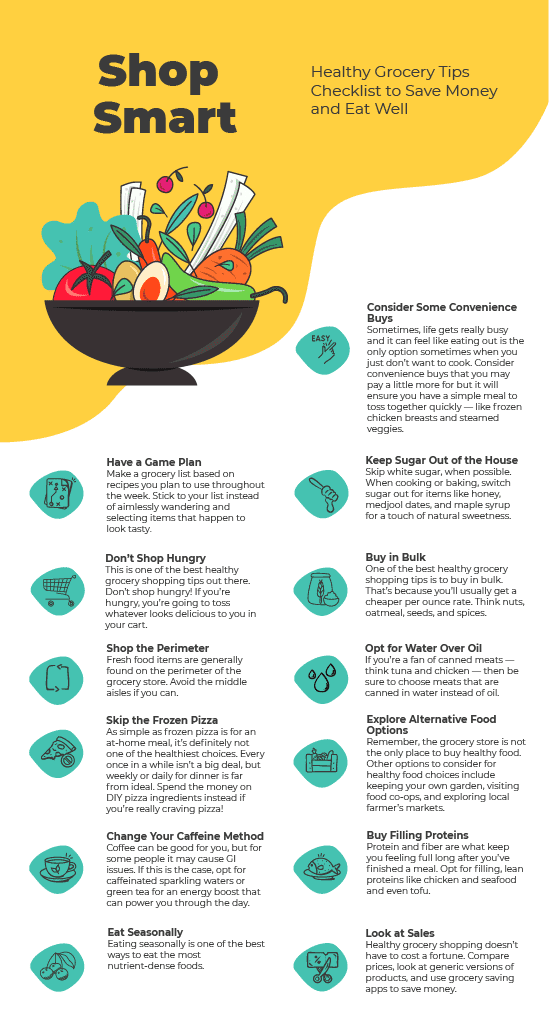Planning meals in advance, sticking to a list, shopping on a full stomach, shopping seasonally, comparing prices, avoiding prepared foods, buying in bulk, not shopping hungover or tired, trying new ingredients, and going for quality over quantity are the top grocery shopping tips for creating a successful meal plan. By following these tips, you can save time and money, make healthy choices, and elevate your meal experience. Grocery shopping can be an enjoyable and money-saving experience if done correctly, and with these tips, you’re ready to plan and execute the perfect meal plan.
Top Grocery Shopping Tips for a Successful Meal Plan
Organizing meal plans can be a daunting task, especially when it comes to grocery shopping. But with the right tips, you can easily create delicious and healthy meals every day by making the most of your grocery shopping trips. Here are some of our top grocery shopping tips to help you plan and execute the perfect meal plan
1. Plan Meals in Advance
One of the most important steps in creating a successful meal plan is to plan your meals in advance. Decide what you want to eat for the entire week and make a grocery list accordingly. This way, you can save time and money by buying everything you need in one go. Planning your meals beforehand can also help you make healthier choices as you won’t be tempted to buy processed or unhealthy foods on a whim.
2. Stick to the List
Once you’ve made the list, stick to it. It can be very easy to get distracted while grocery shopping and start picking up extra items, but this can lead to overspending and wastage. So, keep the list handy and tick off items as you pick them up. This will help you stay on track and avoid unnecessary purchases.
3. Shop on a Full Stomach
Shopping when you’re hungry can be a recipe for disaster. You are more likely to feel tempted to buy junk food or snack on something while shopping. So, make sure you have a meal or snack before heading to the grocery store. This will help you stick to your list and make healthy choices for your body.
4. Shop Seasonally
Buying seasonal produce is not only more sustainable, but it’s also cheaper and tastes better. So, plan your meals around seasonal produce, and you’ll save money and add variety to your meals. Seasonal vegetables and fruits also have higher nutritional value making it a healthy choice for your body.
5. Compare Prices
Comparing prices can help you save money while grocery shopping. Check the cost per unit or per serving on the price tag or use a shopping app to compare prices across different stores. This way, you can buy the same items for less money which can be beneficial in the long run.
6. Avoid Prepared Foods
Prepared foods like ready-made meals, canned soups, and frozen dinners may be convenient, but they tend to be more expensive than making meals from scratch. Plus, they are also packed with preservatives, artificial flavors, and excess salt. So, avoid these prepared foods and cook your meals at home with fresh and healthy ingredients.
7. Buy in Bulk
Buying in bulk can be a great way to save money as you get a lower cost-per-unit. Non-perishable items like rice, pasta, and canned goods can be bought in bulk and stored for a long time. However, make sure to only buy what you need and will use within a reasonable timeframe, as buying in bulk can also be a source of wastage.
8. Don’t Shop Hungover or Tired
Similar to shopping on an empty stomach, shopping when you’re hungover, tired, or in a hurry can make it much harder to stick to your list and make healthy choices. It’s best to plan grocery shopping when you’re feeling fresh and alert, and you won’t be tempted to make unhealthy or impulsive purchases.
9. Try Something New
Trying new recipes and ingredients can add excitement to your meal plan and improve your culinary skills. So, try adding a new ingredient like quinoa or a new spice to your grocery list every week. This way, you can expand your taste buds and make your meals more interesting.
10. Go for Quality over Quantity
While it can be tempting to fill up your cart with a lot of food to save time, it is important to prioritize quality over quantity. Buy good quality meat or fish, fresh fruits and vegetables, and high-quality dairy products. This will ensure that your meals are not only delicious but also packed with nutrients.
Conclusion
Grocery shopping can be an enjoyable and money-saving experience if done correctly. By planning your meals in advance, avoiding prepared foods and buying in bulk, you can save money and maintain a healthy meal plan. Shopping seasonally and prioritizing quality over quantity can also elevate your meal experience. And most importantly, sticking to the list and shopping on a full stomach will ensure you make healthy choices while grocery shopping. With these tips, you’re ready to plan and execute the perfect meal plan. Happy shopping!
